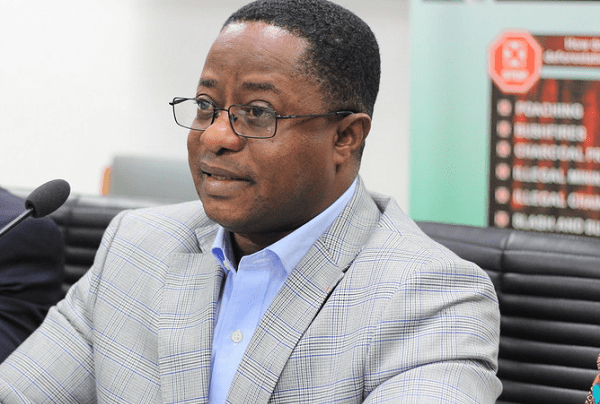
Govt to spend GH¢200m on lifeline electricity consumers — Amewu
The government is to spend GH¢200 million to provide free electricity to lifeline consumers across the country over the next three months, the Minister of Energy, Mr Peter Amewu, has stated.
He said the supply of free electricity would enable more than 65 per cent of lifeline consumers in the three northern regions as well as an average of 25 per cent of such customers in the southern part of the country to enjoy the support.
The minister revealed this when he interacted with the press outside the Chamber of Parliament on Friday.
Context
President Nana Addo Dankwa Akufo-Addo in his 14th address to the nation on government’s interventions of COVID-19, announced that the water and electricity relief had been extended for three and six more months respectively.
Unlike the first intervention which saw the lifeline consumers enjoy free electricity while all others paid 50 per cent of the power they consumed, this latest relief is targeted at only the lifeline consumers.
Advertisement
The Managing Director of ECG, Mr Kwame Agyeman-Budu, told the Daily Graphic last week that nearly 1.7 million consumers of electricity would benefit from the government’s coronavirus disease (COVID-19) relief for the rest of the year.
Of this number, identified as lifeline consumers, about 1.1 million are served by the Electricity Company of Ghana (ECG), with nearly 600,000 also served by the Northern Electricity Distribution Company (NEDCo).
They fall within the group of consumers who use up to 50 kilowatts of power per hour or about GH¢20 worth of power in a month.
Mr Agyeman-Budu explained that the figures were arrived at from the data the company gathered from the implementation of the initial relief that was carried out from April to June this year as part of the government’s intervention to mitigate the impact of COVID-19.
Questions
Mr Amewu had appeared before Parliament to answer questions pertaining to investments in renewable energy for the past one year, the supply of power to deprived communities and street light bills collected.
On July 24, this year, the Minister of Finance, Mr Ken Ofori-Atta, announced the three-month extension of free water and electricity supply for lifeline consumers in Parliament.
The move, he said, was to ameliorate the hardship facing Ghanaians as a result of the outbreak of COVID-19.
Reducing renewable tariffs
Responding to the question on investment channelled into the renewable energy sector, Mr Amewu said since 2017, the government had taken steps to address the challenges it inherited in the sector.
He said renewable energy power purchase agreements (PPAs) to produce 2,265 megawatts (MW) at an average price of $0.1 9 per kilowatt hour (kWh) were signed.
“This is far above what our electricity network could accommodate. Indeed, PPAs were signed for tariffs as high as $0.31 KWh more than twice the average end-user tariff,” he said.
To remedy the imbalance in investment by renewable energy independent power producers (IPPs), he said all the PPAs were reviewed and their capacities were reduced from 2,265MW to 515 MW, which could be accommodated within the network.
“Price/KWh was also re-negotiated and reduced from an average of $0.19/KWh to $o.12/KWh. Further engagements with scheduled PPAs are ongoing to achieve tariffs below $0.10, which is the ministry’s ultimate goal,” he added.
Investments in renewables
The minister added that his ministry had developed a renewable energy master plan which clearly provided the capacity and investment required on yearly bases.
“We have put a moratorium on new PPAs until the 515MW signed PPAs have been executed and provided for competitive bidding of renewable energy projects with focus on utility scale solar power plants,” Mr Amewu said.
He told Parliament that besides the investment by the IPPs in the renewable energy sector, the ministry had also facilitated investments by the government in the construction of the first phase of 17MW solar park by the Volta River Authority (VRA) in Lawra and Kaleo in the Upper West Region at the cost of $25.3 million, with work on the project currently about 40 per cent complete.
The minister pointed out that discussions were ongoing between the government, the VRA and the KM of Germany for additional financing for another 17MW, which would bring the total solar energy production from the two plants to 34MW.
Mr Amewu indicated that Parliament had approved the construction of the Pwalugu Multipurpose hybrid (solar and hydro) project, which was underway.
He said the project, estimated to cost $48 million, would be connected to the national grid.
Renewables and MDAs
Mr Amewu added that the government intended to have public institutions such as ministries, departments and agencies (MDAs) integrate solar in their buildings to reduce their high electricity bills.
To that end, he said, the Ministry of Energy in 2019 added another 60kWh solar photovoltaic (PV) to its existing capacity.
“In addition, the ministry has also awarded contract for the construction of a solar plant to supply about 60 per cent of the total electricity demand at the Jubilee House”.
“The engineering, procurement and construction is being carried out by BSIL/SPS, a wholly-owned Ghanaian company, and work is 70 per cent complete. This project will be commissioned by December 2020,” Mr Amewu said.
